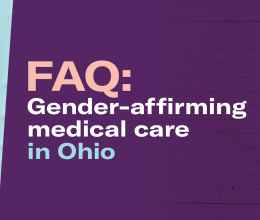Recently, some have been critical of the way in which the ACLU of Ohio has chosen to pursue LGBT equality. Some have even questioned our courage.
First of all, any fight to advance the cause of LGBT equality is a noble one and we are very happy for James Obergefell and John Arthur, who scored a win this week in a lawsuit demanding that their Maryland marriage be recognized on their Ohio death certificates.
That said, we are also a national organization engaged in a nationwide fight. The battles we choose and the cases we take are part of a planned strategy designed to give us the best chance of victory for everyone.
In states like New Mexico and Illinois, where there is no constitutional amendment banning same-sex marriage, this strategy involves fighting aggressively and immediately in court.
Unfortunately, Ohio is one of 29 states with discrimination written into our state constitution. This makes our path longer and more complicated.
Ultimately, the U.S. Supreme Court will decide whether these state amendments violate the federal constitution. With this in mind, it is extremely important for national organizations like the ACLU to set the stage favorably for the next Supreme Court showdown.
How do we do this? We do it by funneling everything we’ve got toward creating strong lower court cases and focusing on districts with appellate courts that are most likely to give these cases a fair hearing.
The ACLU’s Pennsylvania case, involving ten couples in long-term committed relationships plus one widow, is one such case.
The ACLU case in North Carolina is another. This case adds new marriage claims to an existing lawsuit dealing with second-parent adoption for same-sex couples. The addition was made after the Supreme Court specifically mentioned the harm done to children as part of their rationale for striking down DOMA in United States v. Windsor (an ACLU case).
By focusing our legal efforts on these strong cases we maximize the odds of a decisive victory, one in which the Supreme Court mandates marriage equality for all states.
We’re fighting to win, and right now we’re laying the groundwork for that ultimate victory.
The ACLU of Ohio has been in this fight for a very long time. Before today’s statewide LGBT coalition had fully coalesced, we fought the passage of Ohio’s same-sex marriage ban; and after that ban passed, we joined the legal team that successfully limited its scope.
In more recent memory, we have defended LGBT students in Ohio who have been bullied and censored and we’ve instructed school superintendents on their duties to protect LGBT students from bullying. We’ve also lobbied tirelessly for passage of the Equal Housing and Employment Act, and challenged Governor Kasich for refusing to extend anti-discrimination employment protections for gender identity.
We will keep fighting to end discrimination for LGBT Ohioans in school, in the workplace and in housing, so that when marriage equality is achieved–and it will be achieved–it will not be sullied by the many other forms of discrimination that are still legal and commonplace.
Our record is clear. So is our long term goal; complete LGBT equality in all 50 states. Some may want results faster, and they are entitled to their views, but it would be a mistake to confuse strategy with timidity.






